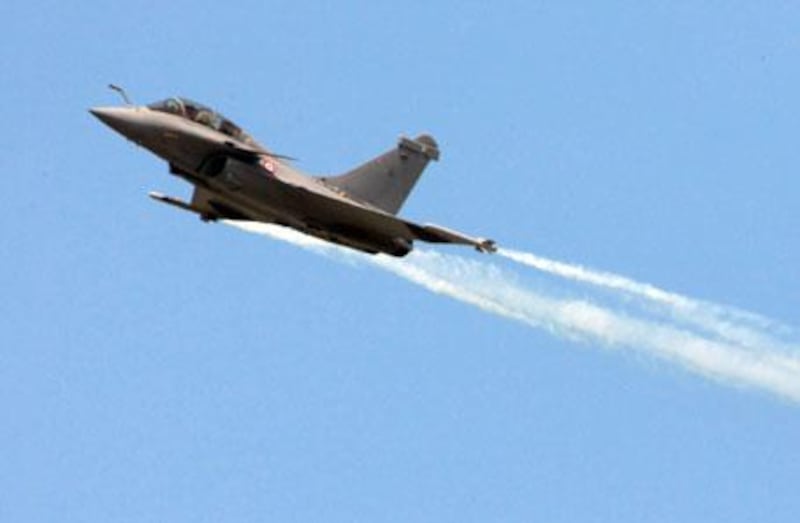KUWAIT CITY // An Islamist group of MPs have threatened to question the prime minister in parliament if the government moves ahead with a plan to buy French Rafale combat jets because they say the aircraft are overpriced and technically deficient.
Faisal al Muslim, one of the four-member Reform and Development Bloc (RDB), said after a press conference in the national assembly building on Sunday that the government is doing the deal "behind a screen" and had not made any attempt to consult with parliament's committee for internal affairs and defence until after the bloc made its opposition clear. He said the group has reports from experts in the Kuwaiti air force that say the plane is "unfit for the Kuwaiti military".
"We say the contract is ambiguous, highly costly; special military reports are refusing it and the minister of defence didn't answer questions from the audit bureau about the contracts," Mr al Muslim said. "We have done everything to try and co-operate with the government. If it continues with its stand, we will question anyone who is concerned - meaning the minister of defence or the prime minister."
The parliament voted unanimously in November to ask the audit bureau to investigate deals with France and the United States for Hercules aircraft, an ammunition factory and the combat jets. "We think there is some corruption, and we will not accept it," Mr al Muslim said. Musallam al Barrak, the spokesman for the Popular Action Bloc, another four-member group of MPs that often opposes the government, later said he supported the RDB's threat to interpellate a minister in regards to the deal.
On Monday, the head of the committee for internal affairs and defence, Askar al Enezi, invited all members of parliament to a committee meeting with Sheikh Jaber al Mubarak al Sabah, the minister of defence, to discuss the package on Sunday. The Islamists' announcement coincided with an official visit of the French chief of defence staff, Admiral Édouard Guillaud, who defended the jet's performance during his trip. Adm Guillaud said the deal for the aeroplanes, made by Dassault Aviation, which also makes Mirage and Falcon aircraft, was "proceeding smoothly", though it was not yet signed, the state news agency, Kuna, and the local press reported.
Adm Guillaud said Kuwait had sent experts to France to access the jets and negotiations had been transparent and without intermediaries. He said France had offered to replace Kuwait's old Mirage jets with the Rafales, and the Kuwaiti government is studying the offer. The details of the deal for the aircraft have not been made public, but the RDB said reports indicate that Kuwait will purchase 28 of the aeroplanes.
Another member of the RDB, Jamaan al Harbash, said the planes will cost Kuwait about US$100 million (Dh367m) each, whereas India has been offered the same jets for $67 million, the online Kuwaiti news agency Alaan reported. He said Russian MiG-35s and US-made F-16s are both more reasonably priced, and other countries such as South Korea, Singapore, Morocco and Holland have rejected the French jet in favour of its competitors.
In a press conference during his trip reported in the local press, Adm Guillaud declined to comment on the details of deals with other countries, but he said the French government is in the final stages of negotiation with Brazil, "finalising specifications" with the UAE, and is in the process of persuading India to buy the aircraft. The UAE also had been in talks with France to update its fleet of Mirage jets with 60 Rafales since June, the state news agency, WAM, reported last year. Brazil announced the decision to begin talks on the purchase of 36 Rafale jets in a joint statement by the presidents of Brazil and France when Nicolas Sarkozy, the French president, visited Brasilia in September, local press reported. And the Indian air force offered a well-publicised tender for 126 combat jets in 2007, in which the Rafale is one of six aircraft competing for the $10 billion deal.
Mr al Muslim did not propose an alternative to the deal. He said the bloc will accept any contract with any country that is agreed "openly, with reasonable prices and accepted by experts". He said the group has no animosity towards French, US or British military forces, which helped to liberate the country from the Iraqi occupation, but "Kuwaiti interests are first". France has worked on improving its military links with Kuwait since details of the country's interest in the jets surfaced more than a year ago. Last year, Mr Sarkozy, visited Kuwait, the two countries held joint military manoeuvres in the desert and leaders signed a defence agreemen. Kuwait is reciprocating with a high-level visit on Friday when the prime minister, Sheikh Nasser al Mohammed al Ahmed al Sabah, will go to Paris.
Even if the two countries' leadership are intent on making a contract, Kuwait's MPs can present a formidable obstacle by threatening to question the ministers - including the prime minister - in the parliament. In 2008, parliamentarians forced the government to back out of a multibillion-dollar venture with Dow Chemical to create a company, K-Dow Petrochemicals. The RDB's concerns this week echoed the arguments of opponents of the Dow deal: a lack of transparency and profiteering middlemen.
jcalderwood@thenational.ae





